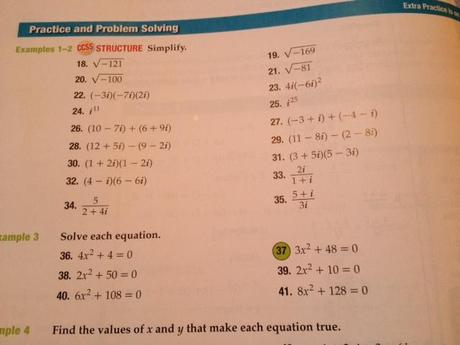 I'll be honest--I took one look at these problems and was clueless about how to solve them. I haven't used any of this since I was faced with a similar-looking textbook page when I was in high school. Luckily my tutee had a sheet of example problems, walking through how to do each type of problem that could be encountered. We studied that together, and then worked on matching the homework problems up to the examples and then solving each one. I had her study the similarities and differences between the various problems and summarize that in writing before I left.
I'll be honest--I took one look at these problems and was clueless about how to solve them. I haven't used any of this since I was faced with a similar-looking textbook page when I was in high school. Luckily my tutee had a sheet of example problems, walking through how to do each type of problem that could be encountered. We studied that together, and then worked on matching the homework problems up to the examples and then solving each one. I had her study the similarities and differences between the various problems and summarize that in writing before I left.Except for the part where I had her summarize, I felt like a big teacher cheater. A total fraud, a huge phony. Someone who was just helping her game the system, focusing on just finding ways to solve the problems rather than really understanding the problems.
I asked her if she knew why she was working with quadratic equations or imaginary numbers. She simply shrugged her shoulders and said, "I have to get this homework done because I'm getting a D." She didn't even know why someone invented the concept of imaginary numbers in the first place. I also asked her if she knew what the "CCSS: Structure" meant in the upper left-hand corner; she didn't know.
Is this the best we can do? Slapping new labels on the same old stuff we've been dishing out to students for years? Still teaching process out of context?
I think we can do better.
